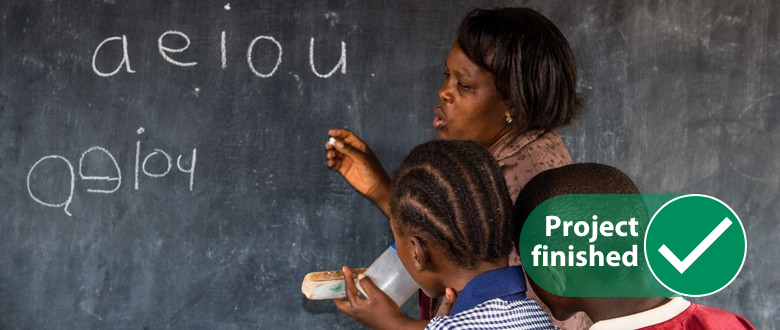
The net enrolment rate for primary education in Zambia was 98% in the period between 2009 and 2013. Zambia’s Ministry of General Education is committed to ensuring that all Zambian children are able to attend, stay, and learn in school. However, being in school does not imply that children learn.
Zambia’s pupils score far below average in numeracy and literacy in the assessments of the Southern and Eastern Africa Consortium for Monitoring Educational Quality. Recent national assessment surveys indicate a fall in learning outcomes. In 2014, 65 per cent of Grade 2 pupils were unable to read a single word correctly in their own language. Approximately 30 per cent of Grade 5 learners cannot read, which means that many fifth graders cannot relate to what is being done in class. Large, heterogeneous classrooms mean that students who lack basic skills never have the chance to catch up. This paves the way for demotivation and drop-out.
Zambia has revised the education curriculum, which now includes teaching in a familiar language up to Grade 4. Implementation began in 2014. To further ensure that learners who have fallen behind in literacy and numeracy are able to catch up to grade-appropriate levels, the Ministry will be implementing a pilot Catch Up programme targeting all learners in Grades 3 to 5 in selected schools in the Southern and Eastern Provinces of Zambia.
- Ministry of General Education (MoGE)
- Zambia Education Sector Support Technical Assistance (ZESSTA) Facility, supported by DFID
- J-PAL Africa
- Innovations for Poverty Action (IPA)
- UNICEF
Two different programme models for TaRL are being tested before moving to scale-up:
- Intensive one-month ‘boot camp’: in the Eastern Province (Chipata and Katete districts), selected schools regroup pupils in Grades 3 to 5 by their reading and numerical ability for an entire month. All learning focuses on teaching numeracy and literacy.
- One hour every day during two school terms: in the Southern Province, (Monze and Pemba districts), schools re-group pupils by ability rather than grade for a concentrated one hour of literacy teaching during one school term, and a mix of literacy and numeracy teaching in the next school term (alternating days).
VVOB Zambia was selected as the preferred partner to provide training and ongoing support to monitors throughout the course of the pilot. VVOB organises teacher training and undertakes school monitoring and mentoring visits. Additionally, VVOB is a key communication link between schools and staff at zonal, district, and national level. VVOB also assists government monitors in training and mentoring teachers. Parents are also supported in the monitoring of the programme. VVOB manages, collates, and assures the quality of the data collected at school and district level, organises regular monitor meetings, and holds refresher training and wrap-up sessions.




